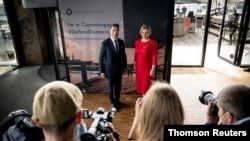The Alliance of Democracies, headquartered in Copenhagen, was sanctioned by Beijing earlier this year, but that has not stopped it from carrying out its self-proclaimed mission of acting as a “megaphone for democracy.”
The organization, led by former NATO Secretary General Anders Fogh Rasmussen, concluded a Democracy Summit this week, and called on democratic nations to establish collective defense in the economic domain, as trade is increasingly being weaponized by Beijing.
Global security continues to require hard power capabilities, “but security is now also a question of soft power capabilities, cyber, energy security, supply chain security, resilience to disinformation campaigns and much more,” Rasmussen told VOA in a written interview from Copenhagen. “In my view, we are seeing an increasing trend of our own freedoms weaponized.”
While noting “social media platforms that have facilitated democratic discourse have been turned into tools to spread disinformation by Russian bots,” Rasmussen expressed concern that “our open economies have made us susceptible to massive Chinese strategic investment that has then been leveraged to serve China’s campaign of economic coercion.”
“If economic coercion is being weaponized, then the free world must find ways to counter it,” he continued.
Rasmussen served as NATO secretary general from 2009 until 2014 and was a two-term Danish prime minister prior to that. He explained the rationale behind founding the Alliance of Democracies in 2017 as “united we stand, divided we fall.” In this spirit, his organization is urging like-minded individuals and governments to co-sign the Copenhagen Charter.
The Charter calls on democratic nations to form an alliance and enact an “economic Article 5” similar to the clause in the North Atlantic Treaty Organization that has often been summed up as “an attack on one is an attack on all” and therefore calls for response from all.
Rasmussen pointed to China’s punitive measures against Australia for the latter’s refusal to cave to Beijing’s demands as a case in point, while adding “many other democracies have been threatened with economic consequences by China for standing up for our values.” He urged nations to look beyond immediate interests and take a principled stand: “Short-term interests will lead us to become silent and complicit in these human rights abuses. That is what China wants, but we must maintain our own autonomy.”
On Thursday in Washington, U.S. Secretary of State Antony Blinken assured visiting Australian Foreign Minister Marise Payne that “the United States will not leave Australia alone on the field, or maybe I should say alone on the pitch, in the face of economic coercion by China.”
To what extent and in what way the United States will defend its longtime ally in its battle against Beijing, was not immediately made clear.





